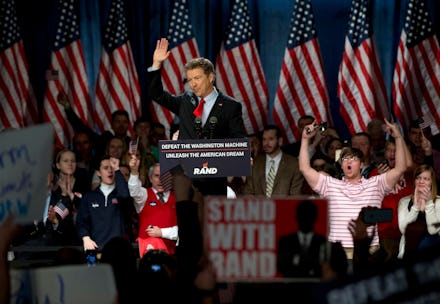One Quote Shows Why Liberals Should Pay Attention to Rand Paul

On Tuesday afternoon in Kentucky, Republican Sen. Rand Paul announced that he would be running for president. In his address at a crowded rally in Louisville, Paul laid out a vision for renewing the country consistent with his libertarian-leaning record.
True to form for a libertarian, Paul's speech included ideas that appeal to people across the political spectrum. To the delight of classic conservatives, he spoke about the dignity of work, shrinking government and slashing taxes. For civil liberties advocates, he promised to end intrusive surveillance programs on his first day in office. His emphasis on peace and shunning nation-building inspired some hope in foreign policy doves.
But there was one line toward the end of speech in the United States that was particularly powerful:
I see an America where criminal justice is applied equally and any law that disproportionately incarcerates people of color is repealed.
If there's one thing that liberals should pay attention to about Paul, this is it. Paul is the only Republican candidate speaking about criminal justice reform, and he has a unique opportunity to present the issue to Republican primary voters in a way that could lead to some real bipartisan consensus for reform.
The importance of criminal justice reform: Paul's audacious statement about criminal justice puts an issue chronically neglected by both parties on the map. His suggestion that the criminal justice system suffers from systemic racism has become a matter of sustained public debate in the wake of the killings of Walter Scott, Michael Brown, Eric Garner and Tamir Rice at the hands of the police. It's an issue that's captured the attention of the whole country, but it's also been polarizing enough that Democrats have been reluctant to tackle the issue head-on.
During the State of the Union address, President Barack Obama deliberately steered clear of making any provocative statements on criminal justice, choosing to speak in fairly abstract and symmetrical terms about the poor relationship between some communities and the police. While the White House and the Department of Justice have taken substantial steps to investigate last year's killings and enacted some small reforms, it's clear that many Democrats aren't eager to publicly embrace the idea that the criminal justice system requires fundamental reform to counteract the ubiquity of racial discrimination.
Paul's record: Paul's past suggests that his convictions on the structural flaws of the criminal justice system run deep. He's declared that he'll "do everything to end the war on drugs." As Vox's Dara Lind notes, he's argued in favor of restricting the juvenile crime records from endlessly trailing young people who have committed crimes. He wants to end mandatory minimum sentences. He'd like to return voting rights to felons, and extend them welfare (a concept which makes most libertarians furious) to ease their transition out of prison.
These policies aren't just about training police officers to treat black residents more respectfully. They go further than that. They're about undoing the radically punitive and debilitating underpinnings of the criminal justice system, which by its very nature disproportionately afflicts people of color.
Paul is not perfect on race and criminal justice. He has made some questionable remarks about the role of poverty in the police killings, for example. But he's the kind of presidential hopeful who flies to Ferguson, Missouri. He's made it clear he has no desire to tolerate the kind of second-class citizenship that the war on drugs has created in this country. If he can make the issue something that all the candidates in both parties are forced to confront, he will have succeeded.